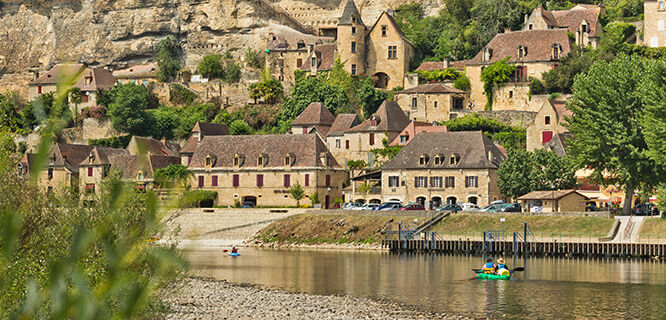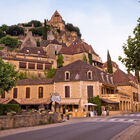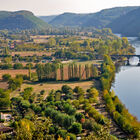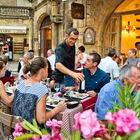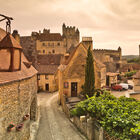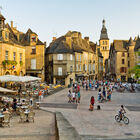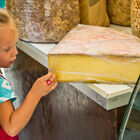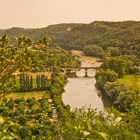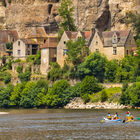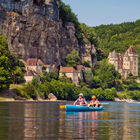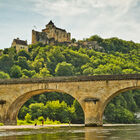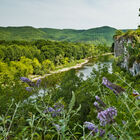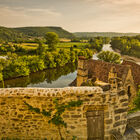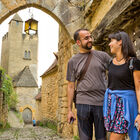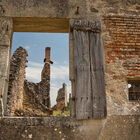Dordogne
The Dordogne River Valley is a delicious brew, blending natural and man-made beauty. Walnut orchards, tobacco plants, sunflowers, and cornfields carpet the valley, while stone fortresses patrol the cliffs above. The joys of the Dordogne include rock-sculpted villages, formidable castles, fertile farms surrounding I-should-retire-here cottages, magnificent vistas, lazy canoe rides, and a local cuisine worth loosening your belt for. It also boasts an amazing cache of prehistoric artifacts — limestone caves decorated with prehistoric artwork litter the Dordogne region.
Places
At a Glance
▲▲▲ La Roque-Gageac Essential and exceedingly cute town (and good home base) that looks as if it had been sculpted out of the rock between the Dordogne River and the cliffs above.
▲▲▲ Beynac The Dordogne River Valley's other must-see sepia-tone village, and home to one of the most imposing castles in France.
▲▲▲ Cro-Magnon Caves Prehistoric caves famous throughout the world for their art (see below).
▲▲▲ Oradour-sur-Glane Ruined village machine-gunned and burned by Nazi SS troops in 1944 and now preserved as a war memorial.
▲▲ Sarlat-la-Canéda Regional market town with a seductive tangle of cobblestone streets peppered with beautiful buildings and traffic-free lanes.
▲▲ Château de Castelnaud Number-two castle in the region (after Beynac's) that still packs a powerful medieval punch.
▲▲ Domme Busy little cliff-capping town with a stunning view over the Dordogne River Valley.
▲▲ Lot River Valley Overlooked but beautiful valley, home to dramatically situated villages like St-Cirq-Lapopie.
▲ Eastern Dordogne Remote and less visited area, highlighted by spectacular hill towns and the pilgrimage village of Rocamadour.
▲ St-Emilion Prosperous little town devoted to Bordeaux wine on the western edge of the region.
Montfort Castle-topped village with a small pedestrian zone.
The Dordogne’s Prehistoric Sights
▲▲▲ Grotte de Font-de-Gaume Last prehistoric multicolored paintings open to public, with strict limits on the daily number of visitors.
▲▲ International Center for Cave Art at Lascaux Exact replicas of the world's most famous cave paintings, and interactive center on cave art.
▲▲ Grotte de Rouffignac Etchings and paintings of prehistoric creatures, such as mammoths, in a large cave accessed by a little train.
▲▲ Grottes de Cougnac Oldest paintings (20,000–25,000 years) open to public, showing rust-and-black ibex, mammoths, giant deer, and a few humans, on a tour more focused on cave geology than art.
▲▲ Grotte du Pech Merle Vivid cave art of mammoths, bison, and horses, plus Cro-Magnon footprint and good museum, about an hour south of the Dordogne in the Lot River Valley.
▲ National Museum of Prehistory at Les Eyzies More than 18,000 well-displayed artifacts offer good background info for patient students.
▲ Abri du Cap Blanc 14,000-year-old carvings that use natural contours of cave to add dimension, but no cave paintings.
▲ La Roque St-Christophe Terraced cliff dwellings where prehistoric people lived.
Prehistory Welcome Center at Les Eyzies Free, helpful intro to region's important prehistoric sites, in Les Eyzies.
Plan
Photos
Watch
Read
- A Three-Hour Joyride in a French Restaurant
- France’s Dordogne: Caves, Canoes, and Culture
- Go Underground to Shine a Light on Europe’s Past
- Oradour-sur-Glane, France’s Ghost-Town Memorial to a WWII Massacre
- Well-Fed Geese in France’s Dordogne
- Market Day in France: Shop, Savor, Slow Down


